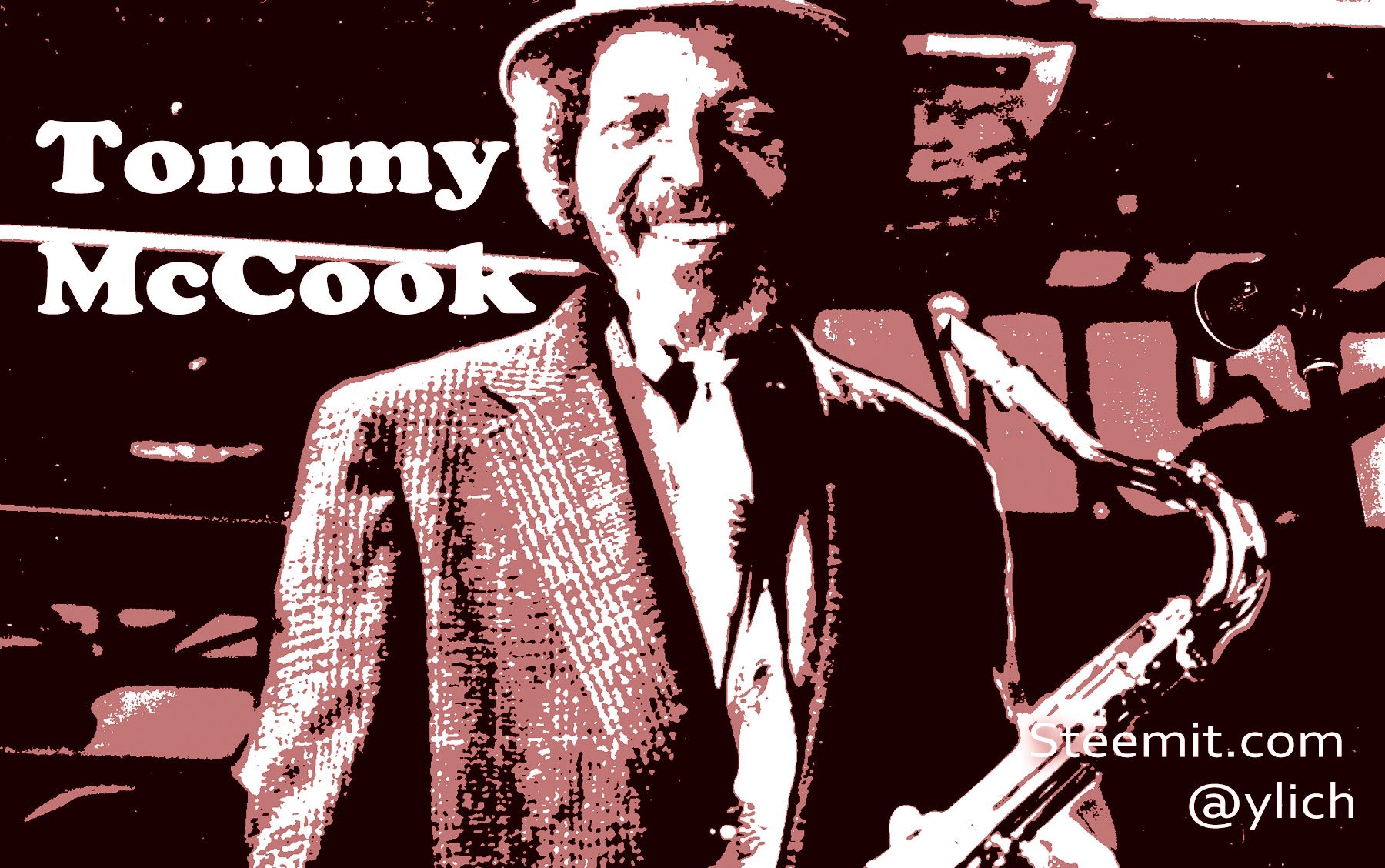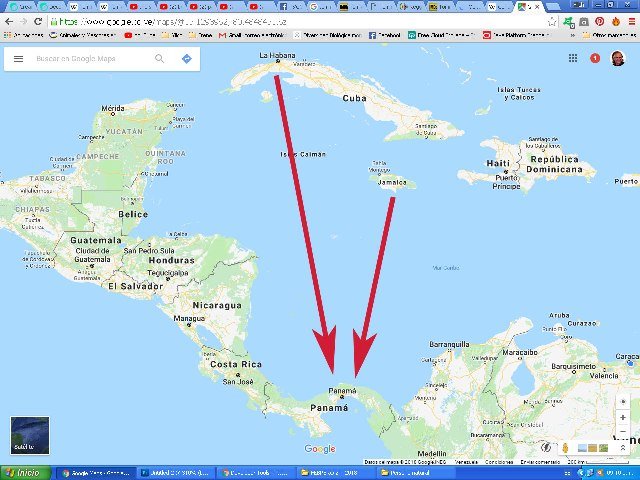In past days @vadimlasca published a post inspired by a comment I made in another post hers. In that first one, he talked about the loops used by Soda Stereo in the song Zoom (spanish only). With regard to those loops I mentioned Fatboy Slim and he took it as a challenge to write about some track of this musician and published his post Musical Deconstruction: Fatboy Slim - Gangster Trippin, in which he mentions, among other sources where Fatboy took his samples from, Tommy McCook. And now it was I who took it as a challenge, to tell a short story related to this musician. Here I go...

A Jamaican born in Cuba
By March 3, 1927, the day Thomas Matthew McCook was born, his father worked in the Panama Canal and those workers (he said) were forbidden to take their families with them, so the McCooks decided that the wife and children were in Cuba during that period. I assume that Cuba-Panama maritime communication were possibly easier than Jamaica-Panama, even though Jamaica is geographically closer to the isthmus.

When he turned six years old the family returned to Jamaica and at the age of eleven already leaned towards music while listening rehearse the band of the school of nuns Alpha Catholic School for Boys, where he studied. The opportunity to enter the band was as a saxophonist, they needed one. He did not waste his opportunity.
After 4 years, already formed musically, the famous bandleader Eric Dean, who regularly recruited musicians from that school, proposed Tommy to audition and that's how he became member of the "Eric Dean's Orchestra" and a professional musician.
A bright career
In a country with the characteristics Jamaica had at that time it wasn't easy to get work in orchestras, which is why most of the musicians emigrated.
Tommy McCook quickly opened his way and became one of the most prominent musicians on the island and finally also left the country moving to the Bahamas where he continued increasing his prestige. At that time they played all the fashionable repertoire of the United States artists like Count Basie, Glenn Miller, Duke Ellington, Stan Kenton or Gene Krupa.
Of course the name he made, led him to be one of the first Jamaican musicians to record an album and also to become soon a music producer.
John Coltraine and a change
Tommy's knowledge of American orchestral music was very broad, since it was what they played on a regular basis. However, in 1956 he traveled to the US for the first time, specifically to Miami, where he heard for the first time John Coltraine, which, in the words of McCook, "changed him life and the way of playing the instrument".
The Jamaican musician fell in love with jazz and decided that from then on he would only play that genre. And he did so for several years, in which he came to promote and participate, along with other prominent musicians of the island, the recording of the first album of "Jazz in Jamaica".
His idols at that moment were Charlie Parker, John Coltrane and Miles Davis.
Those were very lucrative times for Tommy, who was still playing at the Club Zanzibar, in Nassau, Bahamas; recorded radio jingles and kept producing music in Jamaica.
Boredom
Personally, I like to listen to "local" music when I travel somewhere, something that for many is not important and although they are in India, they listen on their iPod the same music they listen every day at home and it does not matter if they are in China or in Saudi Arabia, in Mexico or Russia, they still listen to the same songs of Shakira, Metallica, Justin Biber, Eminem or whatever musical genre they like... But that did not happen with the tourists of the beginning of the 60s, who began to get bored of listening the same jazz repertoire they listened to in their local radios or at home.
And they began to demand that the musicians interpret local rhythms. McCook used to say that by that time he was also a bit bored of it and that's how along with other fellow musicians they started to "mix" jazz and rythm & blues with calypso and mento of African origin. Drummer Lloyd Knibb, who had a great passion for African and Afro-Latin rhythms, was an important piece in this process.
And the Ska was born
And the product of that mixture, that "game" of beats and backbeats, together with the syncopations, were which gave rise to the music we know with the name of Ska and from which years later came other variants such as Rocksteady and Reggae.
In the first project they recorded (which was a studio product) they made nine songs, but they still did not have a name. Someone proposed "The Satellites", to which Tommy responded: "No, if we play Ska, then we'll be the Skatalites".
But we will not expand on the theme of this group, because as Michael Ende would say in his novel The Neverending Story: "...but that's another story and shall be told another time".
When talking about this musician it is important to remember another very important group as it was "The Supersonics", which was created by him after the tragic separation of the Skatalites in 1965.
Other times
Tommy McCook became the advisor of all the projects and the new groups and singers who were dedicated to the Jamaican rhythms. The government of Jamaica decorated him with the "Order of Distinction" for his contributions to the musical heritage of the nation.
In 1983 he was responsible for the re-launch of The Skatalites, a fact that was so successful that it took him to move to the United States, where they made their tours and countless recordings.
Fifth May 1998 marked the end of a career full of successes and achievements, in the city of Atlanta, died one of the most outstanding musicians in the history of Jamaica. On that day Tommy McCook said goodbye.
A curious anecdote
Although Tommy left Cuba very small, presumably being born there marked him. The fact that The Skatalites dedicated a song to Fidel Castro, could have something to do with that and/or maybe some political inclination. But it is also striking that one of the main Ska themes is a song popularized by the very cuban Benny Moré. It's a song that I believed until today was by a Cuban author, because it is an icon in the music of that country: "Pachito e'che". And I say it's curious because, thanks to the Jamaican group, who recorded the song under the title of Latin goes Ska, this tune was widely spread among an audience that never knew of the existence of Pachito e'che, becoming almost an anthem of ska.
To complete the information. Making the research for this post I found out that this is a Colombian song, by the composer Alex Tovar (Wikipedia - Spanish only).
Extras
I leave here these four versions of the same song, the original Colombian tune, the version made by Benny Moré, the one recorded by The Skatalites on1964 and a more recent live version where we can watch Tommy McCook, among others, playing a Sax Solo.

Benny Moré with the Damaso Pérez Prado Orchestra: Pachito E'che

Latin goes Ska, original version recorded by The Skatalites (1964)

Skatalites playing live Latin goes Ska
Sources
- https://en.wikipedia.org/wiki/Tommy_McCook
- http://www.skabadip.com/rubriche/biografie/tommy-mccook_biografia_inglese.htm
- http://www.reggaecollector.com/en/feature/artist.php?artist_id=247
- http://www.independent.co.uk/news/obituaries/obituary-tommy-mccook-1163183.html
- http://reggaelicious.pbworks.com/w/page/8799769/Eric%20Deans%20Band
- http://kingston12.net/reggaes-cuban-connection/





